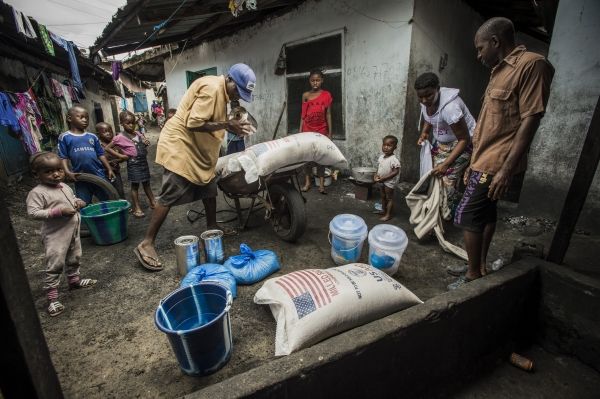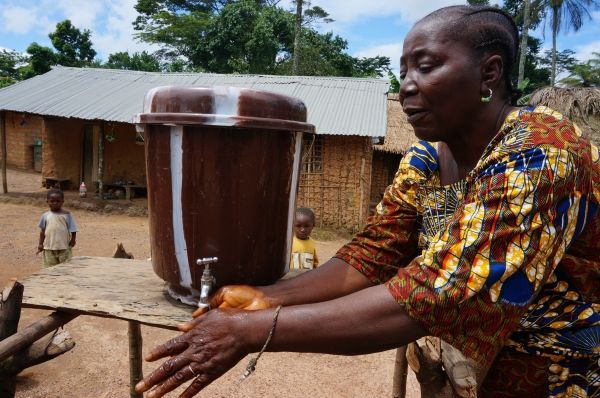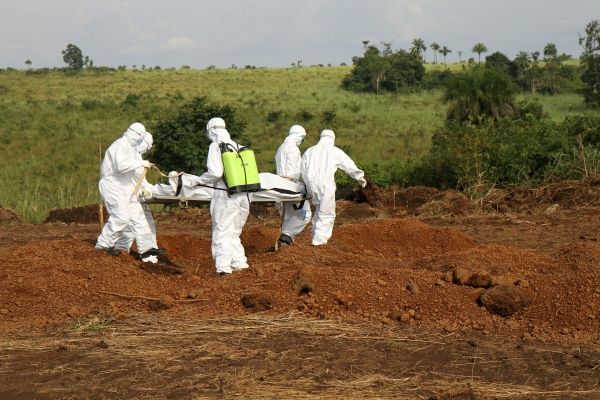Rome-based aid agencies and church organisations tackle west African epidemic
Rome has been at the forefront in the battle against the world's most widespread outbreak of ebola since the disease re-emerged in the west Africa region just over a year ago. The Rome-based United Nations aid agencies and the Vatican's international Catholic Church organisations continue to play a critical role in battling the haemorrhagic virus in Guinea, Liberia and Sierra Leone, where so far there have been over 20,000 suspected cases and more than 8,000 deaths.
However, in late November the ebola focus shifted to Rome itself after an unidentified Italian doctor became infected while working in Sierra Leone for Emergency, the Italian non-governmental organisation (NGO) established in Milan 20 years ago to provide free medical and surgical care to victims of war, landmines and poverty, mainly in Africa and the Middle East. The 50-year-old Sicilian doctor (identified as Fabrizio Pulvirenti only once he was out of danger), was flown to Rome’s infectious diseases clinic at the Lazzaro Spallanzani hospital on Via Portuense, where he was treated with an experimental drug, as well as plasma transfusions from ebola survivors. On 2 January Pulvirenti was declared cured and was discharged from hospital, telling reporters of his intention to return to Sierra Leone.
In September Emergency set up an ebola treatment centre in Lakka – a coastal resort 15 km south of Sierra Leone's capital Freetown – with numerous Italian medical personnel working at the clinic. In early December it opened a first aid post at the Waterloo refugee camp, in an eastern suburb of Freetown, where 22,000 people live in cramped, dilapidated huts. The camp houses Liberian refugees and Sierra Leoneans displaced following the brutal 11-year civil war that ended in 2002. The organisation opened a new treatment centre in Goderich, between Lakka and Freetown, helped with funds from the British government.
Among Rome's cluster of UN aid agencies, the World Food Programme (WFP) is providing the backbone of critical services in the battle against ebola. Working alongside national governments and the World Health Organisation (WHO), since April WFP has distributed food to more than two million people in the three most affected countries, and is working to prevent the health crisis from becoming a food and nutrition crisis. WFP has also been tasked with co-ordinating logistics for the entire humanitarian community involved in the ebola response, ensuring crucial services such as arranging transport, flying experts in and out of affected areas, and providing storage of emergency supplies that can be transported from its depots in Ghanaian capital Accra, Dubai in the United Arab Emirates and Brindisi in Italy.
Working hand in hand with WHO, NGOs and the national governments involved, the Rome-based WFP engineering team designed and constructed ebola treatment centres (ETC) in the Liberian capital Monrovia and across affected areas of Guinea.
"The work scaled up very quickly as the international response kicked off,” Mark Finegan – an engineer with the team – explained to Wanted in Rome. Soon the engineers began a portfolio of other construction schemes in Liberia, Guinea and Sierra Leone, as well as providing infrastructure for UN agencies in Senegal and Ghana. "Once projects are completed, normally within a few weeks,” Finegan said, “their management is handed over to WHO, local health departments or NGOs."
WFP continues to monitor the food security situation across the ebola-affected countries, and the data it collects is critical in shaping the food policies of governments and action by the wider humanitarian community responding to the outbreak.
The focus of Rome's Food and Agriculture Organization (FAO) is avoiding a potential food security crisis in west Africa. Its approach involves safeguarding agricultural livelihoods through social mobilisation, training and awareness-raising activities, as well as helping to boost incomes and agricultural production.
Dominique Burgeon, director of FAO’s Emergency and Rehabilitation Division, stated recently that the region's food security is threatened by “fear of contagion and movement restrictions” which in turn leads to reduced food crop production and less cash. Highlighting the potential risk of food availability due to interregional trade restrictions, Burgeon said: “Guinea, Liberia and Sierra Leone are net cereal importers and in Liberia over 60 per cent of the rice consumed is imported. Declining agricultural production, price spikes and lower incomes can erode the fragile food security situation of the affected countries, which are among the poorest in the world."
In October FAO appealed to donors for $30 million to assist some 90,000 farming households most affected by the outbreak, between now and September 2015.
Rome's International Fund for Agricultural Development (IFAD) is supporting Guinean farmers involved in IFAD-backed projects by helping them pay off loans to local banks and purchase seeds and fertilisers. In Liberia the virus has seen a near collapse of the country’s economy, with reduced trade leading to soaring prices and food shortages, while private merchants are reluctant to deal with farmers from the affected regions. IFAD is investing in long-term agricultural development to build resilience in rural areas, and has pledged $3 million to support WFP in its efforts to address food and nutrition security in rural communities worst hit.
In Sierra Leone IFAD is providing farmers with protective equipment, teaching communities about hygiene and how to deal with ebola, and working with the government to develop a plan to help the agricultural sector recover once the crisis has passed.
The UN aid agencies in Rome all work under the umbrella of the United Nations Mission for ebola Emergency Response (UNMEER) – the first-ever UN emergency health mission – based in Accra.
In November the Vatican held a meeting in Rome to discuss how the Catholic Church is coping in its response to ebola. The meeting was organised by Caritas Internationalis, the confederation of 165 Catholic relief, development and social service organisations around the world. Catholic clergy and medical experts, either in person or via video link from west Africa, convened to share their experiences. The meeting was chaired by Caritas health adviser Mons. Robert Vitillo, who was just back from Liberia. He underlined the role of education and community mobilisation in dealing with ebola, describing it as "the best means of prevention", and stressing the importance of providing clergy, key community leaders and youth groups with basic knowledge about dealing with the virus.
Dr Timothy P. Flanigan, an American infectious diseases specialist and Catholic deacon, had also returned from two months at the National Catholic Health Council in Monrovia. While there he taught staff to practice a "no-touch care" policy which he described as being completely at odds with a doctor's usual hands-on approach. Patients are asked to describe their symptoms and indicate where they hurt, without being touched by medical staff. Stressing the highly contagious nature of the disease, Flanigan said: "One single case of ebola is an outbreak."
In relation to deceased ebola victims, WHO has forbidden family members from conducting the traditional custom of washing the bodies before burial, a measure that causes further pain to communities, according to Flanigan.
However Vitillo explained that Caritas has helped to overturn the WHO policy of a complete ban on clergy or family members attending burials of ebola victims. Now one relative and a member of the clergy can be present, but they must remain at a safe distance from the grave and are forbidden to touch the corpse.
Caritas officials in Rome also outlined the difficult concept of quarantine for communities that are used to working outside, in a very sociable culture.
Looking to the future, the Caritas teams are now planning for the post-epidemic recovery, including caring for orphans of ebola victims.
Andy Devane
This article first appeared in the 14 January edition of Wanted in Rome.
Photos
1. The World Food Programme (WFP) helps to distribute food in Liberian capital Monrovia. Photo: WFP/Rein Skullerud.
2. Preventive measures by the Food and Agriculture Organization (FAO) include installing handwashing kits at roadside stands in Lofa County in northern Liberia.
3. Caritas, church groups and other aid organisations are supporting local government with safe and dignified burials of Ebola victims in Sierra Leone. Photo: CRS.























